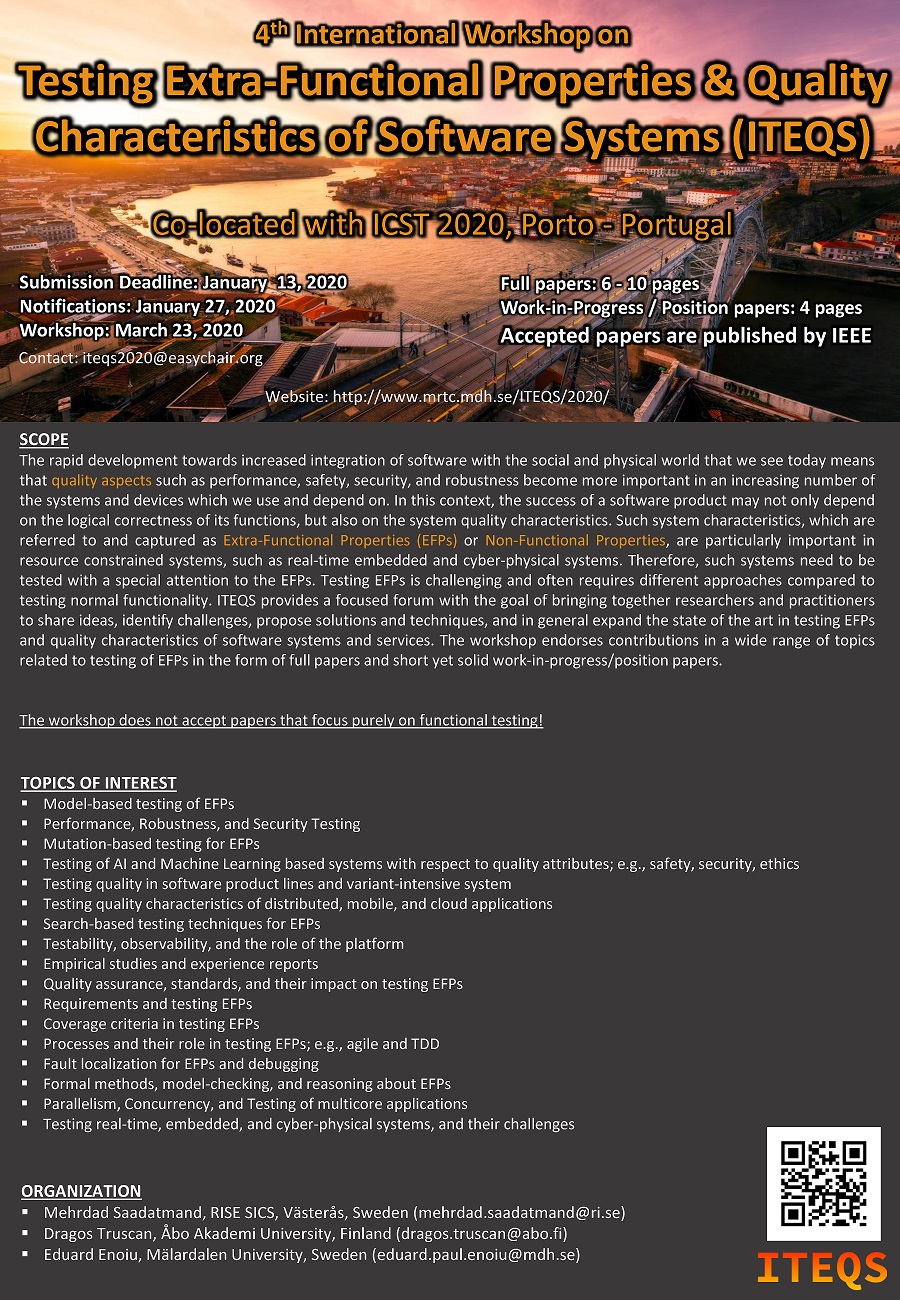You are required to read and agree to the below before accessing a full-text version of an article in the IDE article repository.
The full-text document you are about to access is subject to national and international copyright laws. In most cases (but not necessarily all) the consequence is that personal use is allowed given that the copyright owner is duly acknowledged and respected. All other use (typically) require an explicit permission (often in writing) by the copyright owner.
For the reports in this repository we specifically note that
- the use of articles under IEEE copyright is governed by the IEEE copyright policy (available at http://www.ieee.org/web/publications/rights/copyrightpolicy.html)
- the use of articles under ACM copyright is governed by the ACM copyright policy (available at http://www.acm.org/pubs/copyright_policy/)
ss - technical reports and other articles issued by Mälardalen University is free for personal use. For other use, the explicit consent of the authors is required
- in other cases, please contact the copyright owner for detailed information
By accepting I agree to acknowledge and respect the rights of the copyright owner of the document I am about to access.
If you are in doubt, feel free to contact webmaster@ide.mdh.se
ITEQS 2020: 4th International Workshop on Testing Extra-Functional Properties and Quality Characteristics of Software Systems
Type:
Start time:
End time:
Location:
Description
Website: http://www.mrtc.mdh.se/ITEQS/2020/

4th International Workshop on Testing Extra-Functional Properties and Quality Characteristics of Software Systems (ITEQS)
Co-located with the 13th IEEE International Conference on Software Testing, Verification and Validation (ICST 2020), Porto - Portugal
SCOPE
=====
The rapid development towards increased integration of software with the social and physical world that we see today means that quality aspects such as performance, safety, security, and robustness become more important in an increasing number of the systems and devices, which we use and depend on. In this context, the success of a software product may not only depend on the logical correctness of its functions, but also on the system quality characteristics. Such system characteristics, which are referred to and captured as Extra-Functional Properties (EFPs) or Non-Functional Properties, are particularly important in resource constrained systems such as in the domains of real-time embedded and cyber-physical systems. Therefore, such systems need to be tested with a special attention to the EFPs. Testing EFPs is challenging and often requires different approaches compared to testing normal functionality. ITEQS provides a focused forum with the goal of bringing together researchers and practitioners to share ideas, identify challenges, propose solutions and techniques, and in general expand the state of the art in testing EFPs and quality characteristics of software systems and services. The workshop endorses contributions in a wide range of topics related to testing of EFPs in the form of full papers and short yet solid work-in-progress/position papers.
Note: The workshop does not accept papers that focus purely on functional testing!
TOPICS
======
- Model-based testing of EFPs; e.g., choice of modeling languages to capture EFPs and their role on testability, model-based test case generation, etc.
- Performance, Robustness, and Security Testing
- Mutation-based testing for EFPs; e.g., application of mutation techniques for testing of EFPs particularly introduction of EFP-specific mutation operators
- Testing of AI and Machine Learning based systems with respect to quality attributes; e.g., such as safety, security, and ethical concerns
- Testing quality in software product lines and variant-intensive system
- Testing quality characteristics of distributed, mobile, and cloud applications
- Search-based testing techniques for EFPs
- Testability, observability, controllability and the role of the platform; e.g., how the choice of operating system can impact testability of EFPs, for instance, a real-time operating system, introducing testability mechanisms into a platform, designing - middlewares for testing of EFPs
- Empirical studies and experience reports; e.g., on the importance of testing EFPs, evaluation of testing methods, case-study and reports on project failures due to EFPs, comparison of methods and techniques
- Quality assurance, standards, and their impact on testing EFPs
- Requirements and testing EFPs; e.g., identification and generation of test oracles for EFPs from requirements, requirements for testability, traceability
- Coverage criteria in testing EFPs
- Processes and their role in testing EFPs; e.g., agile and TDD
- Fault localization for EFPs and debugging
- Formal methods, model-checking, and reasoning about EFPs
- Parallelism, Concurrency, and Testing of multicore applications
- Testing real-time, embedded, and cyber-physical systems, and their challenges
SUBMISSION GUIDELINES
=====================
Paper format: 1) full papers 6-10 pages, 2) solid work-in-progress and position papers 4 pages; in IEEE double column format.
Submission site: https://easychair.org/conferences/?conf=iteqs2020
Accepted papers will be published in IEEE Digital Library.
IMPORTANT DATES
===============
Submission deadline: January 13, 2020
Notifications: January 27, 2020
Workshop date: March 23, 2020
ORGANIZERS
==========
Mehrdad Saadatmand, RISE SICS Västerås, Sweden (mehrdad.saadatmand[at]ri.se)
Eduard Enoiu, Mälardalen University, Sweden (eduard.paul.enoiu[at]mdh.se)
Dragos Truscan, Åbo Akademi University, Finland (dragos.truscan[at]abo.fi)
Contact: iteqs2020@easychair.org
PROGRAM COMMITTEE
=================
Brian Nielsen, Aalborg University, Denmark
Cristina Seceleanu, Mälardalen University, Sweden
Fabrizio Pastore, University of Luxembourg, Luxembourg
Mahsa Varshosaz, IT University of Copenhagen, Denmark
Vahid Garousi, Queen’s University, Belfast, UK
Jeff Offutt, George Mason University, USA
Bestoun S. Ahmed, Karlstad University, Sweden
Yvan Labiche, Carleton University, Canada
Shaukat Ali, Simula Research Laboratory, Norway
Björn Lisper, Mälardalen University, Sweden
Antonia Bertolino, CNR (National Research Council), Italy
Bernhard K. Aichernig, Graz University of Technology, Austria
Zohaib Iqbal, National University of Computer and Emerging Sciences, Pakistan

